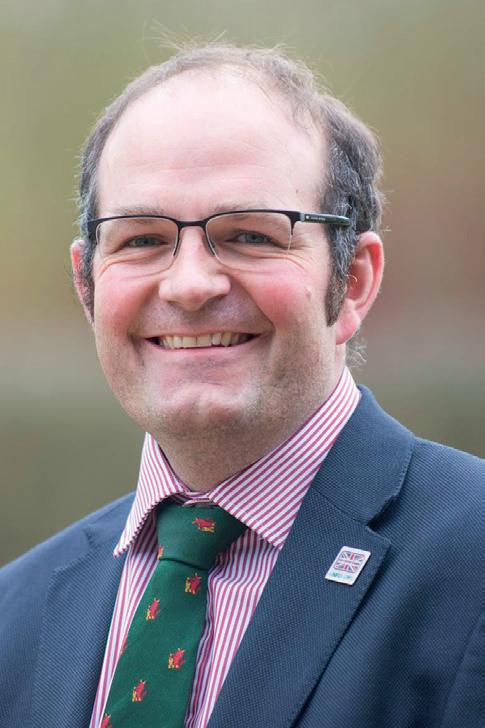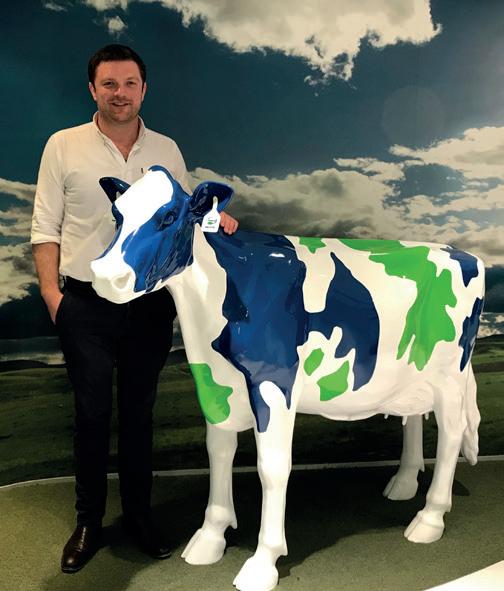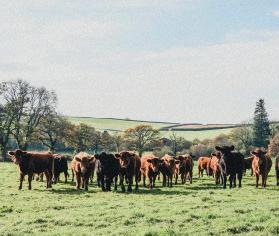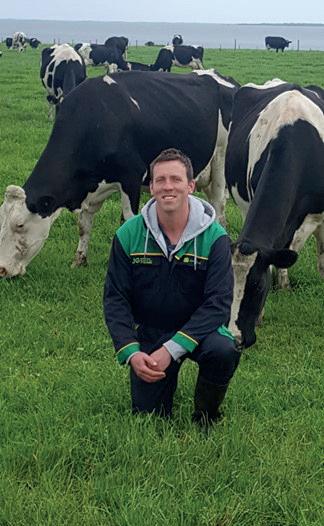
5 minute read
What Nuffield Farming did for me
WHAT MY NUFFIELD FARMING SCHOLARSHIP DID FOR ME
ALAN BECKETT MBE, NSch 1957
Advertisement
Alan Beckett obtained his Nuffield Farming Scholarship in 1957 but never imagined the effect it was going to have on him or his family’s farming business.
His original aim was to see the new herringbone milking parlours in operation in America and decide if they would be the answer for his family’s dairy farm in Worcestershire. He travelled 26,000 miles in a battered old car bought in the States, not just looking at parlours but working in them physically to gain experience. Importantly he also took any opportunity to learn about farming practices in general and began to realise the most important lessons involved finance and money management. He was learning about budgeting, cash flow and making money work for the business. Americans were far ahead of their British counterparts in that direction. Returning home, Alan tried to convince the landlord to provide the necessary setup for a large, intensive dairy business, but was unsuccessful. So he thought instead about the progressive egg production units he had seen in the States. All in all, a far higher return on capital could be obtained than with dairying, and rapid expansion was possible. He persuaded his father to sell the cows and let him have a go. His subsequent rise in the egg industry was meteoric, Becketts Farm becoming one of the UK’s largest egg producers. Initially most of the eggs were sold at the back door and this has developed into a comprehensive retail operation which includes a butchery, bakery, greengrocery, deli, sandwich bar, gifts and goodies, and coffee shop. There is also a 170-cover restaurant, a conference centre and cookery school, in all employing over 100 people. The latter developments took place after egg production had been stopped in 1995 when Alan’s son Simon, also a Nuffield Farming Scholar, took over as MD, and realised the writing was on the wall for commodity production. Alan has remained Chairman of the company. Alan has served on the board of the British Egg Marketing Board, received an MBE in 1987 for Services to Agriculture, and was Chairman of both the NFU Poultry Committee and Midland Shires Farmers, then the largest agricultural co-op in the country.
To this day, Alan credits his Nuffield Farming Scholarship for his success. “As time passed, I realised the tremendous advantage I had over my contemporaries because of my Scholarship and what it had taught me. I believe in repaying what others give you and Nuffield gave me so much that, in 1996, my wife and I decided we would sponsor a Nuffield Farming Scholar of our own each year.”
Alan and Anne have now funded 23 Scholars – all hands-on in farming or an allied land-based business – who have demonstrated an entrepreneurial or innovative spirit. The Becketts believe Scholarships are designed to develop the nous and potential of practising farmers who show an ability to think outside the box. The programme gives them the resilience they will need to overcome the unpredictable challenges that will undoubtedly lie ahead.
WHAT MY NUFFIELD FARMING SCHOLARSHIP DID FOR ME

TOM BRADSHAW NSch 2011
“Looking back what impact did the scholarship experience have on you?” I have never been clear why or how, but I know when I arrived back from the CSC I had a different perspective of global agriculture, a greater confidence to articulate the challenges and opportunities, and had met and heard from some inspiring leaders that shaped my thinking. I wouldn’t say there was one lightbulb moment, but over the course of my 18 month scholarship I developed a clear view of what I thought was sustainable for the future of global food production. I was lucky enough to meet a full range; from pioneering organic advisors and producers through to biotech giants in South America. When I applied for my scholarship, I thought that the UK and EU were at the forefront of world agriculture, but hearing others refer to the EU as the museum of world agriculture raised questions and challenges. We use the latest scientific developments within the medical industry, but we aren’t able to use the same science to develop truly sustainable food production systems. The most challenging part of the scholarship was at the ACRES USA conference where everything in conventional agriculture was being challenged and questioned. To go through the process of questioning why you are doing everything; from suing synthetic fertiliser to pesticides was a very powerful exercise. Within the farm we have become far more business focussed and alongside this have tried to develop an approach that utilises direct drilling and cover crops where possible. With the structure of our business being based around contract farming this is more challenging with focus often on short term results rather than longer term fertility and sustainability. “What have been your wider achievements since your Nuffield Scholarship?” The most notable moment was in 2012, my Nuffield report was still hot off the press, and I answered the phone in the middle of harvest to “It’s X from the BBC here, could we come and see you? By the way we have read your Nuffield report”. That phone call led to me representing the Industry on BBC Harvest (sold to me as opportunity to reconnect the public with farming). Going into the farmyard with 20+ people in high-viz jackets during harvest in 2013 I questioned my decision, but it was a fantastic programme and an amazing experience to be part of – meeting Greg Wallace and Philippa Forrester (one of them was lovely) in the process. I had been slightly critical of the AHDB in my report, but highlighted that many farmers around the world would love to have a levy board such as the AHDB, but it was funded by us and we needed to take responsibility for steering the ship. This led to us applying to become an AHDB Monitor Farm. I also got more involved with the NFU – I was on the East Anglia crops board at the time of my scholarship but in 2014 I was appointed to the National board before becoming Chair and then earlier this year was elected Vice President of the NFU.






